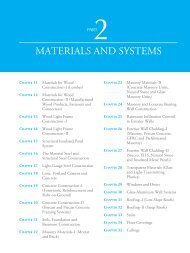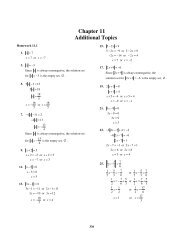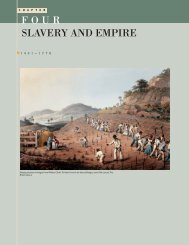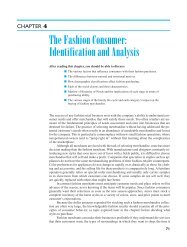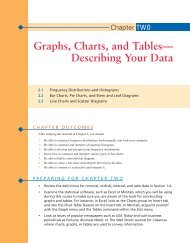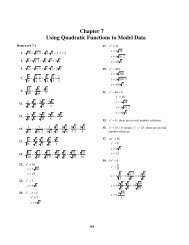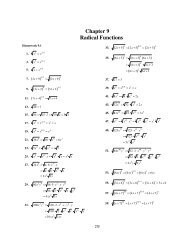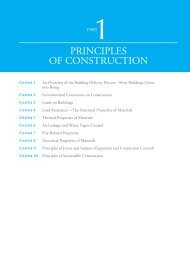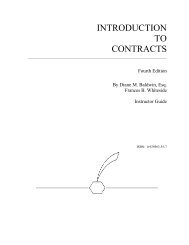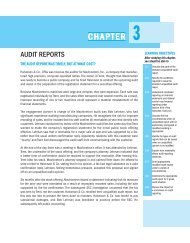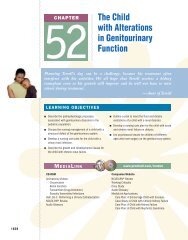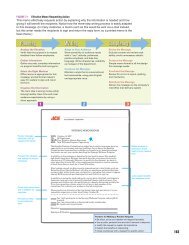A prolific painter of portraits before and after the French Revolution ...
A prolific painter of portraits before and after the French Revolution ...
A prolific painter of portraits before and after the French Revolution ...
Create successful ePaper yourself
Turn your PDF publications into a flip-book with our unique Google optimized e-Paper software.
ch07.qxd 12/2/04 11:59 AM Page 352<br />
352<br />
Chapter 7<br />
explaining<br />
American groups (252). Hayakawa believes this is <strong>the</strong> result <strong>of</strong> having<br />
learned English. Hayakawa states, “A common tongue encourages trust<br />
while reducing racial hostility <strong>and</strong> bigotry” (252). Hayakawa, one <strong>of</strong> <strong>the</strong><br />
original founders <strong>of</strong> U.S. English, believes that unless <strong>the</strong> United States<br />
implements an English-only policy, we will head <strong>the</strong> way <strong>of</strong> Quebec or<br />
India: India’s “ten <strong>of</strong>ficial languages” have created a situation that is “a<br />
chaotic mess which has led to countless problems in <strong>the</strong> government’s efforts<br />
to manage <strong>the</strong> nation’s business” (253). According to Hayakawa, <strong>the</strong><br />
problem in <strong>the</strong> United States is already apparent. He blames <strong>the</strong> 50 percent<br />
dropout rate among Hispanic students on <strong>the</strong> current bilingual policy (254).<br />
Writers such as Hayakawa forecast a Tower <strong>of</strong> Babel. They believe that unless<br />
we adopt an English-only policy, immigrants will not learn English<br />
<strong>and</strong> U.S. citizens will not be able to communicate with each o<strong>the</strong>r. Of<br />
course, Hayakawa’s analogy with Quebec <strong>and</strong> India may be difficult to support,<br />
because immigrants to <strong>the</strong> United States have always learned English,<br />
whereas in Quebec <strong>and</strong> India, people have always spoken different languages.<br />
As a champion <strong>of</strong> English-only legislation, Richard Rodriguez, like<br />
<strong>the</strong> late Senator Hayakawa, believes that without <strong>the</strong> government to push<br />
immigrants into learning English, <strong>the</strong>y will not learn English. In “Aria: A<br />
Memoir <strong>of</strong> a Bilingual Childhood,” Rodriguez states, “What I needed to<br />
learn in school was that I had <strong>the</strong> right, <strong>and</strong> <strong>the</strong> obligation, to speak <strong>the</strong> public<br />
language. ...It would have pleased me to hear my teachers address me<br />
in Spanish....But I would have delayed—postponed for how long?—having<br />
to learn <strong>the</strong> language <strong>of</strong> public society” (270). Although Rodriguez was<br />
born in <strong>the</strong> United States, <strong>the</strong> son <strong>of</strong> migrant workers, he was not exposed<br />
to English until he entered school. Without his Catholic schoolteachers’<br />
forcing him to learn English, Rodriguez believes that he would never have<br />
learned to speak <strong>the</strong> public language (271). Like people on both sides <strong>of</strong> <strong>the</strong><br />
English-only issue, Rodriguez believes that to succeed in <strong>the</strong> United States,<br />
it is necessary to be pr<strong>of</strong>icient in English. Because Rodriguez was not motivated<br />
to speak English as a child, he feels that it is imperative for <strong>the</strong> government<br />
to push immigrants to learn English by making English <strong>the</strong> <strong>of</strong>ficial<br />
language <strong>of</strong> <strong>the</strong> United States.<br />
In addition, <strong>the</strong> website for U.S. English agrees with Hayakawa <strong>and</strong><br />
Rodriguez that without English-only legislation, immigrants will “fail to<br />
learn English <strong>and</strong> separate into linguistic enclaves. This division <strong>of</strong> <strong>the</strong><br />
United States into separate language groups contributes to racial <strong>and</strong> eth-<br />
4<br />
5<br />
PROFESSIONAL COPY—NOT FOR RESALE



